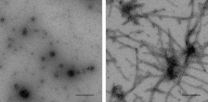(Press-News.org) Durham, N.C., U.S. and Melbourne, Australia -- A team of Duke University Medical Center and Australian scientists has found that addictive drugs may have hijacked the same nerve cells and connections in the brain that serve a powerful, ancient instinct: the appetite for salt.
Their rodent research shows how certain genes are regulated in a part of the brain that controls the equilibrium of salt, water, energy, reproduction and other rhythms – the hypothalamus. The scientists found that the gene patterns activated by stimulating an instinctive behavior, salt appetite, were the same groups of genes regulated by cocaine or opiate (such as heroin) addiction.
"We were surprised and gratified to see that blocking addiction-related pathways could powerfully interfere with sodium appetite," said co-lead author Wolfgang Liedtke, M.D., Ph.D., an Assistant Professor of Medicine and Neurobiology at Duke University. "Our findings have profound and far-reaching medical implications, and could lead to a new understanding of addictions and the detrimental consequences when obesity-generating foods are overloaded with sodium."
The study was published in the Proceedings of the National Academy of Sciences early edition online on July 11.
"Though instincts like salt appetite are basically genetic neural programs, they may be substantially changed by learning and cognition," said co-lead author Professor Derek Denton, of the University of Melbourne and the Florey Neuroscience Institute, who is renowned for his pioneering work in the field of instinctive behavior. "Once the genetic program is operating, experiences that are part of the execution of the program become embodied in the overall patterns of an individual's behavior, and some scientists have theorized that drug addiction may use nerve pathways of instinct. In this study, we have demonstrated that one classic instinct, the hunger for salt, is providing neural organization that subserves addiction to opiates and cocaine."
Deeply embedded pathways of an ancient instinct may explain why addiction treatment with the chief objective of abstinence is so difficult, said Denton. Liedtke said that this might be relevant given the appreciable success of maintenance approaches that don't involve abstinence, like replacing heroin with methadone and cigarettes with nicotine gum or patches.
"The work opens new pathways of experimental approach to addiction," Denton said.
The study was the first to examine gene regulation in the hypothalamus for salt appetite. The team used two techniques to induce the instinctive behavior in mice – they withheld salt for a while combined with a diuretic and they also used the stress hormone ACTH to increase salt needs.
Liedtke, who is also affiliated with the Duke Center for Translational Neuroscience and the Duke Pain Clinics, said the researchers were surprised that they could detect that genes were "turned on" or "turned off" in salt appetite, these patterns were often substantially reversed within ten minutes of the animals' drinking salt solution, well before any significant salt could be absorbed from the gut into the bloodstream. The question of how this occurs is perplexing, and opens an entirely new field for exploration, Liedtke said.
In terms of survival advantage of this behavior, fast satisfaction of salt appetite makes sense. Among wild animals, the ability to rapidly compensate for salt need by avidly lapping a salty solution means that depleted animals can drink to gratification and leave quickly, reducing their vulnerability to predators.
The Duke-Melbourne research team found that when the animal harbors a robust sodium appetite, a certain region of the hypothalamus seems to become susceptible to the effects of dopamine, which is the brain's internal currency for reward. That suggests that the state of the instinctive need, the sodium-depleted state, "spring-loads" the hypothalamus for the subjective experience of reward which follows when animals gratify the need – a satisfied feeling. This concept is substantiated by their finding that the local actions of dopamine on a sub-region of the hypothalamus are critical for the animals' instinctive behavior.
INFORMATION:
Other Duke authors include Hao Zhang, Andreas Pfenning and Sarah Hochendoner. The Melbourne team included Michael McKinley, Andrew Lawrence, John Drago, and Lesley Walker of the Florey Neuroscience Institute. The team also included Donald Hilton of the University of Texas Health Science Center in San Antonio.
Support came from the G. Harold and Leila Y. Mather's Foundation, The Robert J Jr. and Helen C. Kleberg Foundation, the Search Foundation, Ms. Diana Gibson, Mr. Robert Albert, Mr. Baillieu Myer, and Dr. Mark Nelson, the NH&MRC of Australia Fellowship, The Derek Denton Endowment Fund, a Trinity College Undergrad Fellowship, a Robert H. Ebert Clinical Scholarship of the Klingenstein Fund and start-up funds from Duke University.
A classic instinct -- salt appetite -- is linked to drug addiction
2011-07-12
ELSE PRESS RELEASES FROM THIS DATE:
Landscape change leads to increased insecticide use in the Midwest
2011-07-12
MADISON - The continued growth of cropland and loss of natural habitat have increasingly simplified agricultural landscapes in the Midwest. A Great Lakes Bioenergy Research Center (GLBRC) study concluded that this simplification is associated with increased crop pest abundance and insecticide use, consequences that could be tempered by perennial bioenergy crops.
While the relationship between landscape simplification, crop pest pressure, and insecticide use has been suggested before, it has not been well supported by empirical evidence. This study, published online in ...
Regional system to cool cardiac arrest patients improves outcomes
2011-07-12
A broad, regional system to lower the temperature of resuscitated cardiac arrest patients at a centrally-located hospital improved outcomes, according to a study in Circulation: Journal of the American Heart Association.
Cooling treatment, or therapeutic hypothermia, is effective yet underused, researchers said.
A network of first responders, EMS departments and more than 30 independent hospitals within 200 miles of Minneapolis, Minn., and Abbott Northwestern Hospital collaborated to implement the protocol.
"We've shown that a fully integrated system of care, from ...
Obstructive sleep apnea linked to blood vessel abnormalities
2011-07-12
Obstructive sleep apnea may cause changes in blood vessel function that reduces blood supply to the heart in people who are otherwise healthy, according to new research reported in Hypertension: Journal of the American Heart Association.
However, treatment with 26 weeks of continuous positive airway pressure (CPAP) improved study participants' blood supply and function.
Obstructive sleep apnea, which causes periodic pauses in breathing during sleep, affects about 15 million adults in the United States, according to the American Heart Association. The sleep disorder ...
Nearly all patients with high-grade bladder cancer do not receive guideline-recommended care
2011-07-12
A study at UCLA's Jonsson Comprehensive Cancer Center found that nearly all patients with high-grade, non-invasive bladder cancer are not receiving the guideline-recommended care that would best protect them from recurrence, a finding that researchers characterized as alarming.
In fact, out of the 4,545 bladder cancer patients included in the study, only one received the comprehensive care recommended by the American Urology Association and the National Comprehensive Cancer Network.
Receiving the recommended comprehensive care for high-grade bladder cancer is critical ...
Do-it-yourself brain repair following stroke
2011-07-12
Stroke is a leading cause of long-term disability and death in the United States. A team of researchers — led by Gregory Bix, at Texas A&M College of Medicine, College Station — has identified a way to exploit one of the brain's self-repair mechanisms to protect nerve cells and enhance brain repair in rodent models of stroke. The authors suggest that this approach could provide a nontoxic treatment for stroke.
The most common form of stroke (ischemic stroke) occurs when a blood vessel that brings oxygen and nutrients to the brain becomes clogged, for example with a blood ...
PXR: A stepping stone from environmental chemical to cancer?
2011-07-12
Several chemicals that can accumulate to high levels in our body (for example BPA and some pesticides) have been recently linked to an increased risk of cancer and/or impaired responsiveness to anticancer drugs. A team of researchers, led by Sridhar Mani, at Albert Einstein College of Medicine, New York, has now identified a potential mechanistic link between environmental exposure to these foreign chemicals (xenogens) and cancer drug therapy response and survival.
PXR is one protein by which cells (including tumor cells) can sense xenogens. In their study, Mani and colleagues ...
JCI online early table of contents: July 11, 2011
2011-07-12
EDITOR'S PICK: Do-it-yourself brain repair following stroke
Stroke is a leading cause of long-term disability and death in the United States. A team of researchers — led by Gregory Bix, at Texas A&M College of Medicine, College Station — has identified a way to exploit one of the brain's self-repair mechanisms to protect nerve cells and enhance brain repair in rodent models of stroke. The authors suggest that this approach could provide a nontoxic treatment for stroke.
The most common form of stroke (ischemic stroke) occurs when a blood vessel that brings oxygen and ...
Vitamin D insufficiency prevalent among psoriatic arthritis suffers
2011-07-12
New research reports a high prevalence of vitamin D insufficiency and deficiency among patients with psoriatic arthritis. Seasonal variation in vitamin D levels was not observed in patients in southern or northern locations. The findings published today in Arthritis Care & Research, a journal of the American College of Rheumatology (ACR), also show no association between disease activity and vitamin D level.
Psoriasis is a common chronic skin disorder, likely caused by an autoimmune response, and is characterized by red scaly patches on the surface of the skin. When ...
SUMO defeats protein aggregates that typify Parkinson’s disease
2011-07-12
A small protein called SUMO might prevent the protein aggregations that typify Parkinson's disease (PD), according to a new study in the July 11, 2011, issue of The Journal of Cell Biology (www.jcb.org).
Insoluble protein clusters are the hallmarks of several neurodegenerative diseases. In PD, neurons harbor insoluble clumps of the protein alpha-synuclein. What triggers these protein pileups remains obscure. A possible clue for PD came when researchers overexpressed alpha-synuclein in human kidney cells and found that the protein was modified by the addition of the small, ...
Climbing the social ladder seems to lessen high blood pressure risk
2011-07-12
Social mobility - upwards - seems to curb the risk of developing high blood pressure among those born on the lower rungs of the ladder, suggests research published online in the Journal of Epidemiology and Community Health.
Being born into poor or disadvantaged backgrounds has been linked with an increased risk of high blood pressure, which is a known contributory factor to an increased risk of heart disease and stroke.
The authors wanted to see if that risk was affected by climbing up the social ladder across generations.
They used data from the Swedish Twin Registry ...

